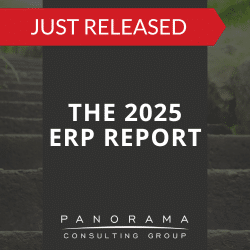When Joan Jett sang, “I don’t give a damn ’bout my reputation,” she probably wasn’t speaking as part of the C-suite. Truth is, executives put a lot of time and effort into what their clients, potential clients and the public at large thinks about them. What they sometimes fail to consider, however, is what their employees think. This can have serious ramifications come ERP implementation time. Staff members who don’t trust in the organization, who don’t believe in what they’re being told, and who don’t share a common vision for the future will prove difficult to manage, motivate and align around an ERP project or, really, any large-scale change. Take it from us: disgruntled employees can bring down your implementation. And they can bring it down faster and harder than any of those technical issues you’ve been worrying about.
The first step to address this issue, and help avoid an ERP failure, is to start early. If you’ve decided to begin shopping around for ERP systems, then the time to get your organizational change management plan in place is today. Right now. The second step? To be honest. It can be hard to admit that your company might be approaching communications and goal-setting the wrong way . . . especially if you’re the one who crafted and delivered all that messaging. But even if you’re not seeing eye-rolls and hearing grumbles, you can pick up on the mood of your employees by walking the floor, talking to all levels of staff and really observing their reactions to top-down directives. Don’t ask your managers for reports; the only way to truly gauge what your employees are thinking about you, your organization and your organization’s goals is to get out there, watch and listen. And then be honest with yourself about what you find out. If it’s good, great. If it’s not so good, start making efforts to change.
The third step is to take our free ERP Readiness Assessment. The questionnaire offers an opportunity to rate a number of organizational aspects, including:
- Employees’ respect of upper management
- Employees’ willingness to learn
- Employees’ ability to adapt to new changes
- Communication between employees and management
- Employees’ accountability
- Employees’ work ethic
- Work environment
While Panorama consultants use a much more detailed readiness assessment to advise our clients, this is a good starting point to gather some metrics and create some internal dialogue about the organization and your strengths and weaknesses moving into an ERP project. An honest assessment of these issues will give you some good information about what your organization’s internal reputation is today . . . and what you’d like it to be in the future. Check out additional tools and research, including an ERP ROI Calculator and ERP Implementation Checklist, in our ERP Resource Center.












